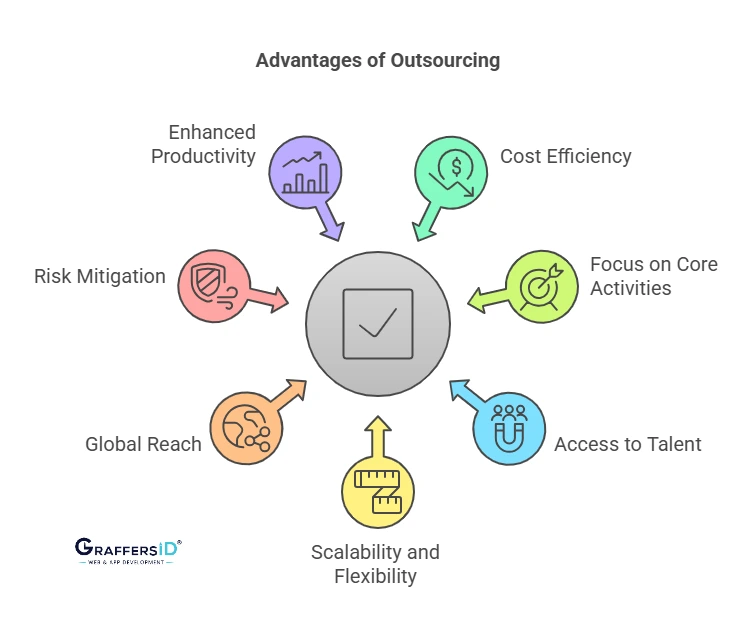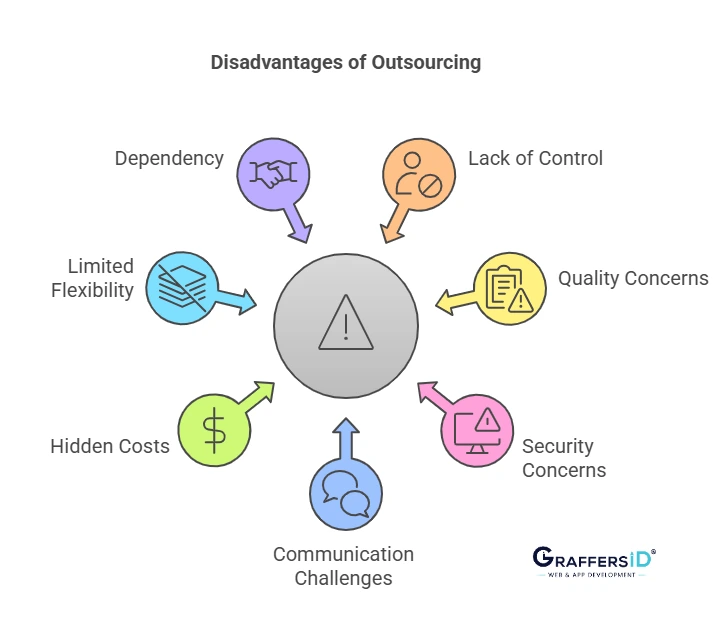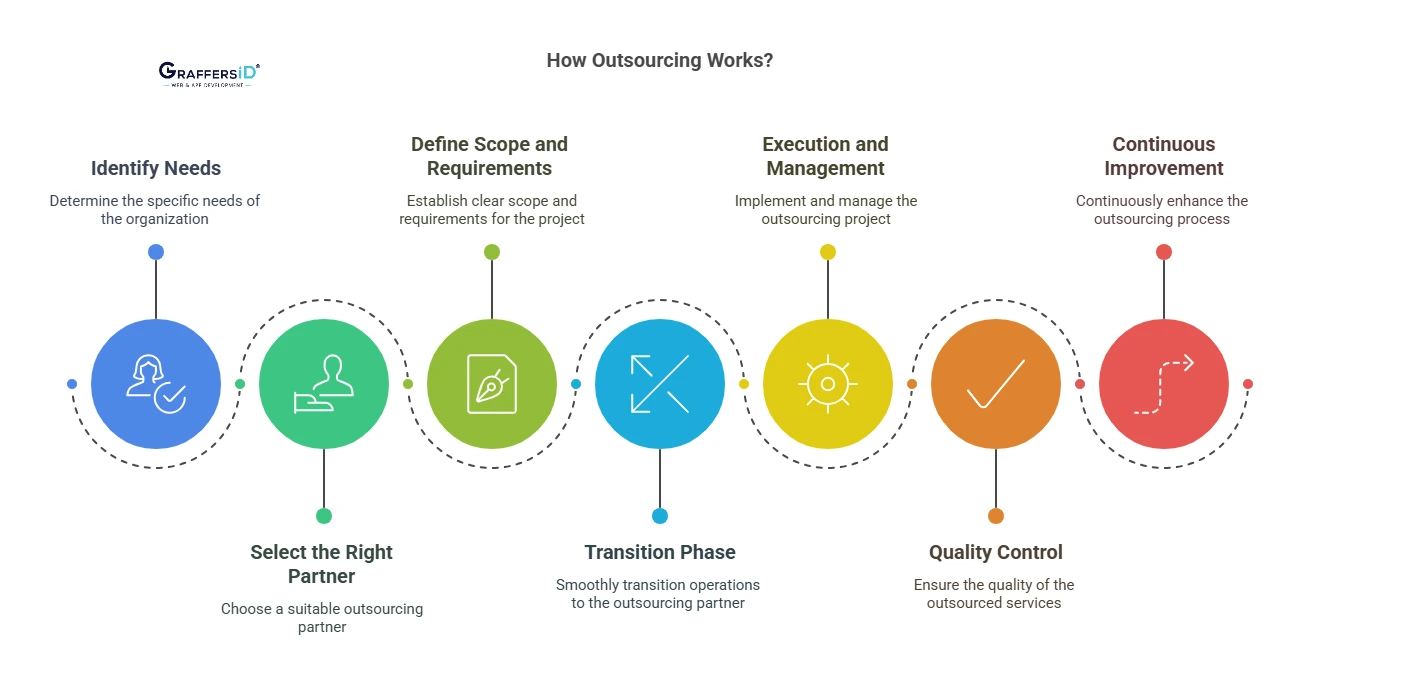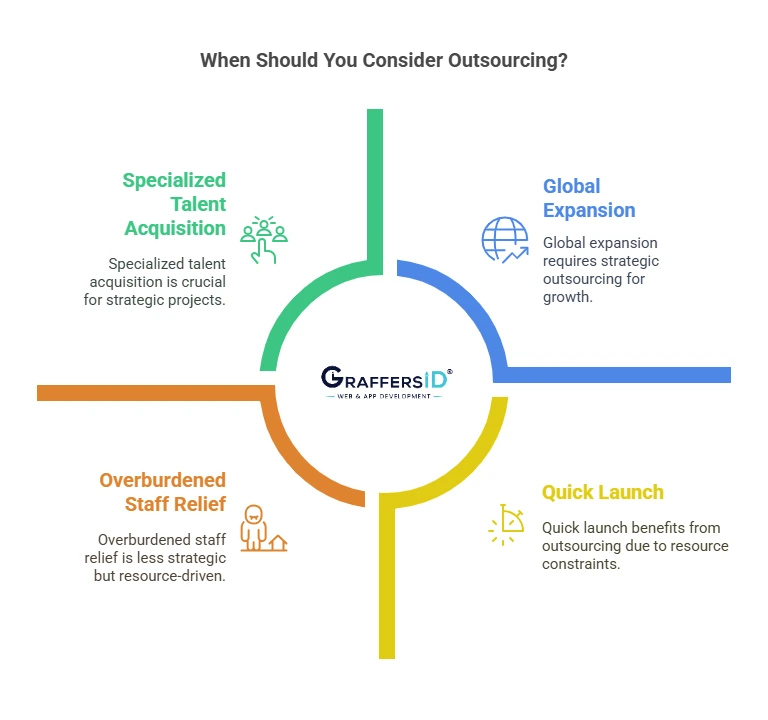Outsourcing has become a fundamental component of modern business practices, enabling web & app development companies to tap into specialized skills, reduce costs, and focus on their core competencies. However, like any strategic decision, outsourcing comes with its share of advantages and disadvantages. In this blog, we will delve into the meaning of outsourcing, analyzing its pros and cons to help you make informed choices for your business.
What is Outsourcing?
Outsourcing is the process of delegating particular tasks or complete activities to third-party service providers instead of managing them in-house. It allows businesses to access external expertise, save time, and focus on their core skills. These functions can span a wide spectrum, including but not limited to customer support, information technology, human resources, finance, manufacturing, data entry, content creation, logistics, and various administrative processes. The primary motive behind outsourcing is allocating specific business activities to external specialists or service providers, who often have a more profound understanding of those activities, combined with the potential for significant cost savings.
Recent market insights show that one of the most commonly outsourced services is development or support, with over 70% of tech companies currently outsourcing some or all of their processes.
Read More: Staff Augmentation vs. Outsourcing: Choosing the Right Model for Your Business
Advantages of Outsourcing

1. Cost Efficiency
Cost efficiency is one of the most compelling advantages of outsourcing. By outsourcing non-core functions such as customer support, data entry, or accounting, businesses can significantly reduce their operational costs. Outsourcing allows organizations to tap into the expertise of specialized service providers who can perform tasks at a fraction of the cost it would require to maintain an in-house team. This cost-saving enables businesses to allocate resources to more critical areas of their operations, such as research and development or marketing.
2. Focus on Core Business Activities
Every organization has unique strengths and core competencies that set it apart from its competitors. Outsourcing non-core functions allows businesses to concentrate on what they do best. Instead of diverting valuable time and resources toward tasks like IT maintenance or payroll processing, companies can redirect their efforts toward innovation, product development, and customer satisfaction. This focus on core competencies can drive growth and increase competitiveness in the market.
3. Access to Specialized Talent
Outsourcing partners often possess specialized expertise in their respective fields. Whether it’s software development, digital marketing, or customer service, outsourcing companies are equipped with the knowledge, skills, and technology to deliver high-quality results. This access to specialized expertise can lead to improved efficiency, innovation, and overall quality of the services provided. It’s like having a team of experts at your disposal without the burden of recruitment and training.
4. Scalability and Flexibility
The business world is inherently unpredictable, with fluctuations in demand and market conditions. Outsourcing offers the advantage of scalability and flexibility. When your business needs fluctuate, it’s much easier to adjust the scope and scale of outsourced services compared to managing an in-house team. You can quickly scale up or down to meet your changing requirements, without the hassle of hiring or laying off employees.
5. Global Reach
Outsourcing can provide your business with a global reach. By collaborating with offshore partners, you can tap into new markets and expand your presence internationally. This can be especially beneficial for companies seeking to establish a global footprint without the complexities of setting up physical offices in foreign countries.
6. Risk Mitigation
Sharing responsibilities with outsourcing partners can also help mitigate certain risks. For example, when you outsource IT services, you transfer the responsibility for security and compliance to the service provider. This not only reduces the risk of data breaches but also ensures that you stay up to date with industry standards and regulations.
7. Enhanced Productivity and Efficiency
Outsourcing tasks to experts can lead to enhanced productivity and efficiency. With the burden of routine and time-consuming activities lifted, your in-house teams can work on more strategic and high-value tasks, ultimately increasing productivity and delivering better results.
Disadvantages of Outsourcing

1. Lack of Control
When a company outsources certain functions or processes, it inevitably loses a degree of control over them. Whether it’s customer support, manufacturing, or IT services, entrusting an external partner means relying on their systems, procedures, and timeline. This can lead to discrepancies in quality and service, making it challenging to maintain consistent standards. If the outsourcing partner makes changes that do not align with the company’s objectives, it can have a detrimental effect on the business.
2. Quality and Security Concerns
Maintaining quality and security standards can be challenging when outsourcing. Data breaches, intellectual property theft, or quality control issues can arise if the outsourced partner doesn’t adhere to the same strict standards as the parent company. In some industries, like healthcare and finance, maintaining data security and regulatory compliance is crucial, and outsourcing can pose significant risks in this regard.
3. Communication Challenges
Language barriers, time zone differences, and cultural distinctions can lead to communication challenges. Effective communication is critical for successful outsourcing relationships. Misunderstandings can lead to errors, missed deadlines, and frustration. It is essential to invest in strong communication channels and processes to mitigate these issues, which can sometimes lead to an increased cost of outsourcing.
4. Hidden or Unexpected Costs
One of the most significant disadvantages of outsourcing is the potential for hidden costs. While outsourcing often appears cost-effective on the surface, companies can incur unexpected expenses. These include legal fees, renegotiations, and additional management overhead. Furthermore, the outsourcing partner may increase their fees or encounter unforeseen difficulties, leading to higher overall costs. Companies must conduct thorough due diligence and include a financial buffer in their outsourcing budget.
5. Limited Flexibility
Once a company enters into an outsourcing agreement, it may find it challenging to adapt to changing circumstances or market conditions. Contracts can be rigid and difficult to amend, making it hard for a company to pivot its strategy when necessary. This lack of flexibility can hinder innovation and adaptation.
6. Dependency on the Outsourcing Partner
Overreliance on an outsourcing partner can lead to a risky single point of failure. If the outsourcing partner encounters financial troubles, changes ownership, or goes out of business, it can disrupt a company’s operations and put it in a precarious position. Companies must have contingency plans in place to mitigate such risks.
The decision to outsource should be based on a careful consideration of the advantages and disadvantages. For some companies, outsourcing can be a strategic move that streamlines operations, reduces costs, and fosters growth. However, it is not a one-size-fits-all solution. Success in outsourcing depends on careful planning, strong communication, and ongoing management of relationships with outsourcing partners. To maximize the benefits while mitigating the risks, it’s crucial to assess the specific needs and circumstances of your business.
How Outsourcing Works?

Outsourcing involves a series of complex steps and mechanisms:
1. Identify Needs
The process commences with a thorough assessment of the company’s internal capabilities and requirements. The identification of tasks that could be effectively outsourced is a crucial first step.
2. Select the Right Partner
Once the need is established, the company embarks on a quest to identify and select an outsourcing partner. This process typically involves conducting extensive research, soliciting proposals, and evaluating potential service providers based on criteria such as expertise, reputation, past performance, and cost-effectiveness.
3. Defining Scope and Requirements
A critical aspect of outsourcing is the clear definition of the scope of work. Both the client and the outsourcing provider collaborate to establish service-level agreements, expectations, performance metrics, and quality standards. These parameters form the foundation of the outsourcing relationship.
4. Transition Phase
Following the agreement on the scope of work, the outsourcing provider initiates the transition phase. This phase involves the transfer of knowledge, setting up infrastructure, and recruitment or training of personnel as required to ensure the seamless execution of outsourced functions.
5. Execution and Management
The client company typically retains an active role in managing the outsourcing relationship. This entails regular communication, performance monitoring, and necessary adjustments to ensure that the outsourcing partner continues to meet the established standards.
6. Quality Control
Ensuring that the outsourced functions consistently meet the agreed-upon quality standards is a crucial component of outsourcing. Regular audits and evaluations help maintain the quality of the services provided.
7. Continuous Improvement
The relationship between the client company and the outsourcing partner is characterized by a commitment to continuous improvement. Both parties work collaboratively to identify opportunities for process optimization, cost reduction, and enhanced efficiency.
Read More: Top 12 IT Outsourcing Companies
When Should You Consider Outsourcing?

Outsourcing can be a good decision if:
- You need to launch quickly, but lack internal resources.
- Your budget is tight and doesn’t allow for local full-time hiring.
- You require specialized talent for a short-term project.
- Your internal staff is overburdened with operational tasks.
- You want to grow globally without building local offices.
Conclusion
In 2025, outsourcing is no longer just about reducing costs, it is a strategic practice for driving growth. However, effectively managing the partnership and understanding the consequences of choices are necessary for success. Choosing the right outsourcing partner and taking a proactive approach might help you convert possible risks into scalable opportunities.
Are you seeking a reliable and innovative outsourcing partner to fuel the growth of your business? Look no further. GraffersID is your gateway to success. Our team of dedicated professionals is here to provide you with top-notch solutions tailored to your specific needs. Whether it’s web and mobile app development, UI/UX design, digital marketing, or any other technology-driven service, we’ve got you covered. Contact us today, and let’s embark on a journey to success together. Your vision, our expertise – the perfect partnership.





